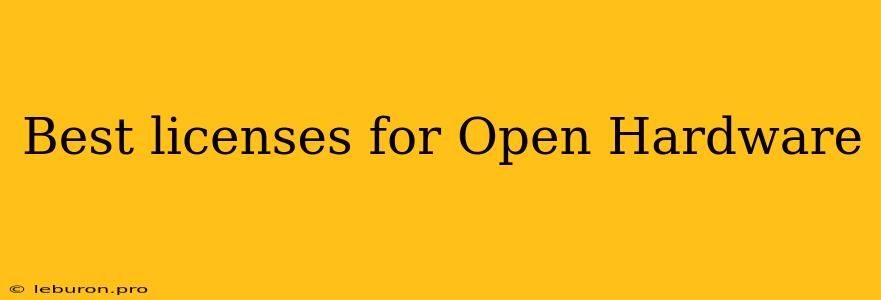Open hardware is a movement that encourages the sharing of designs for hardware components, such as electronics, software, and mechanical parts. It is a powerful force in innovation, allowing for the creation of new and exciting products that would otherwise be impossible. However, choosing the right license for your open hardware project is crucial for ensuring its success. The best licenses for open hardware are those that balance the need for collaboration and innovation with the protection of intellectual property rights. This article will delve into the various licenses available, explore their benefits and limitations, and guide you in selecting the best fit for your open hardware project.
The Importance of Licensing for Open Hardware
Before diving into specific licenses, let's understand why licensing is essential for open hardware projects. It's akin to a legal contract outlining the rights and responsibilities of anyone using or modifying the hardware design.
Here's why licensing matters:
- Freedom and Collaboration: Licenses define the freedom users have to study, modify, distribute, and commercially use the hardware. They foster a collaborative environment where individuals can build upon each other's work.
- Intellectual Property Protection: Licenses can help protect the original creator's rights by specifying how others can use and distribute the design.
- Clarity and Transparency: Clearly defined licenses eliminate ambiguity and ensure that all involved parties understand their rights and obligations.
Understanding Open Hardware Licenses: A Deep Dive
The open hardware licensing landscape offers a diverse range of choices, each with its own advantages and drawbacks. Here's a breakdown of some of the most popular licenses and their key features:
1. Creative Commons Licenses (CC BY-SA, CC BY-NC-SA)
- CC BY-SA (Attribution-ShareAlike): This license allows users to share, adapt, and commercially use the hardware design as long as they attribute the original creator and distribute any modifications under the same license.
- CC BY-NC-SA (Attribution-NonCommercial-ShareAlike): Similar to CC BY-SA but prohibits commercial use.
Pros:
- Widely recognized and easy to understand.
- Promotes sharing and collaboration.
Cons:
- The ShareAlike requirement might limit the design's use for projects with different licensing needs.
2. Open Hardware License (OHL)
- OHL v1.0 and v1.1: These licenses are specifically designed for hardware projects and allow users to modify, distribute, and commercially use the design as long as they attribute the original creator.
Pros:
- Tailored for hardware projects.
- Encourages innovation and commercialization.
Cons:
- Less popular than CC licenses.
3. The TAPR Open Hardware License (TOH)
- TOH: Designed for complex hardware projects, TOH allows users to modify, distribute, and commercially use the design but requires them to obtain permission from the original creator for certain modifications.
Pros:
- Offers greater control over derivative works.
- Suitable for projects requiring stricter control over modifications.
Cons:
- Can be perceived as restrictive, potentially limiting collaboration.
4. GNU Lesser General Public License (LGPL)
- LGPL: Typically used for software, but also applicable to hardware components with software dependencies. It allows users to link the hardware design to proprietary software, offering flexibility for commercial applications.
Pros:
- Enables integration with proprietary software.
- Promotes open source software development.
Cons:
- Can be complex to understand and apply.
Choosing the Right Open Hardware License
The selection of the best licenses for open hardware is not a one-size-fits-all solution. Consider these factors when making your decision:
- Intended Use: Will the design primarily be used for educational purposes, research, or commercial products?
- Collaboration Level: How open do you want the project to be? Do you want to encourage widespread modification and distribution?
- Intellectual Property Control: How much control do you want over derivative works?
- Licensing Compliance: Ensure the license you choose complies with relevant laws and regulations in your region.
A Few Practical Tips
- Be Transparent: Clearly state the chosen license on your project's website and documentation.
- Use Open Source License Tools: There are online tools that can help you understand and compare different licenses.
- Seek Legal Advice: If you're unsure about the legal implications of a particular license, it's wise to consult with a lawyer specializing in intellectual property.
Conclusion
Choosing the best licenses for open hardware is a critical step in ensuring your project's success. It's about finding a balance between collaboration, innovation, and intellectual property protection. By understanding the various options available and carefully considering your project's goals, you can select a license that fosters a thriving community while safeguarding your rights. Remember, a well-chosen open hardware license can unlock the full potential of your project and contribute to the broader open hardware movement.
